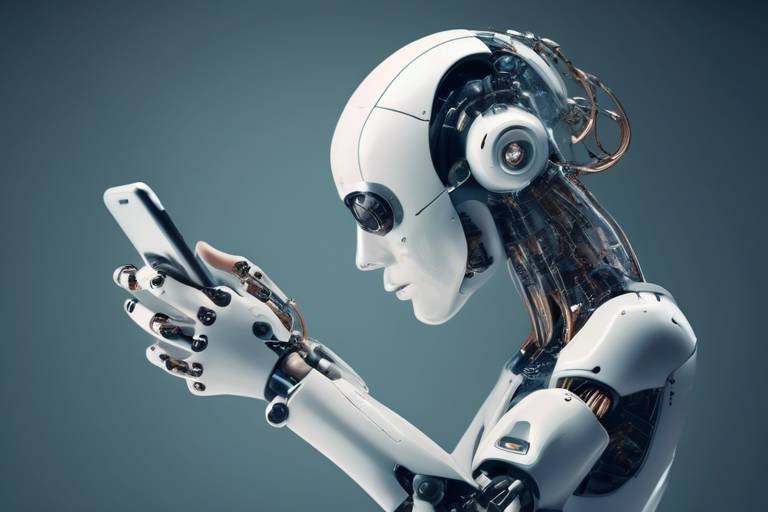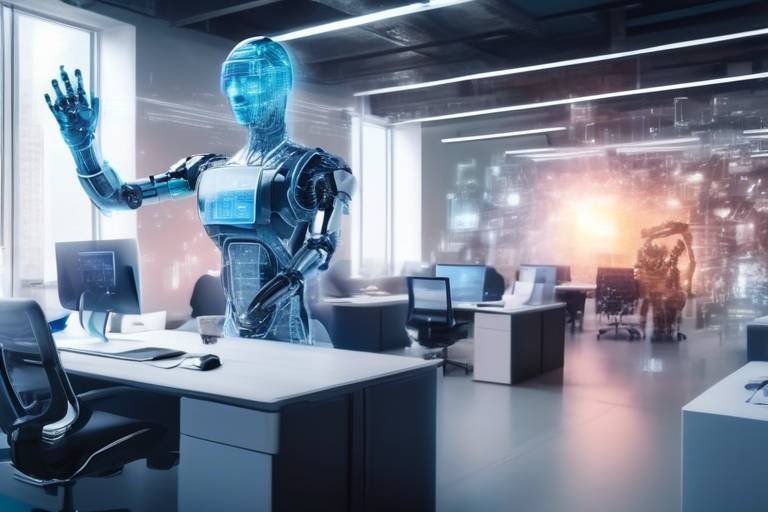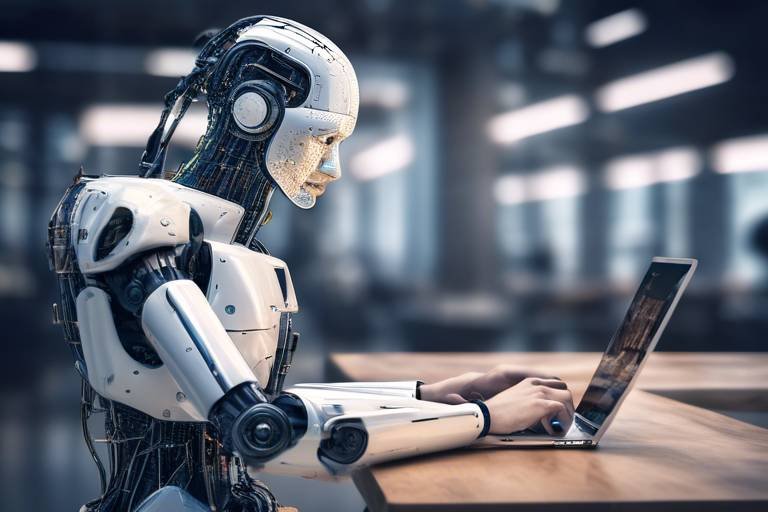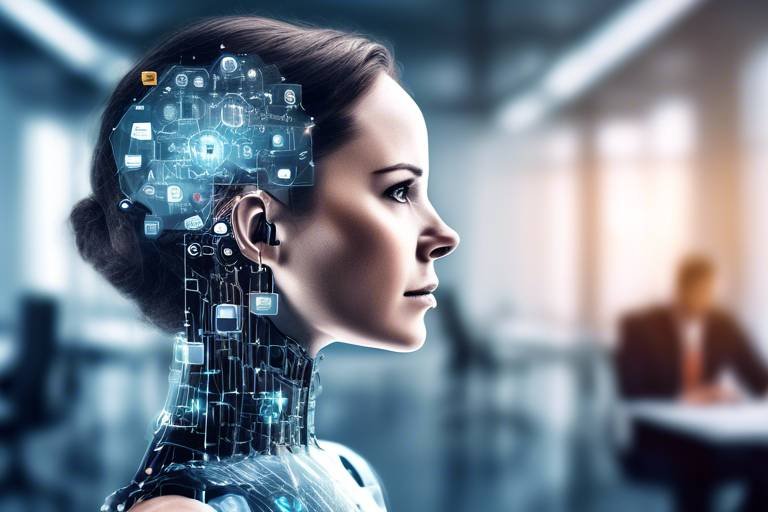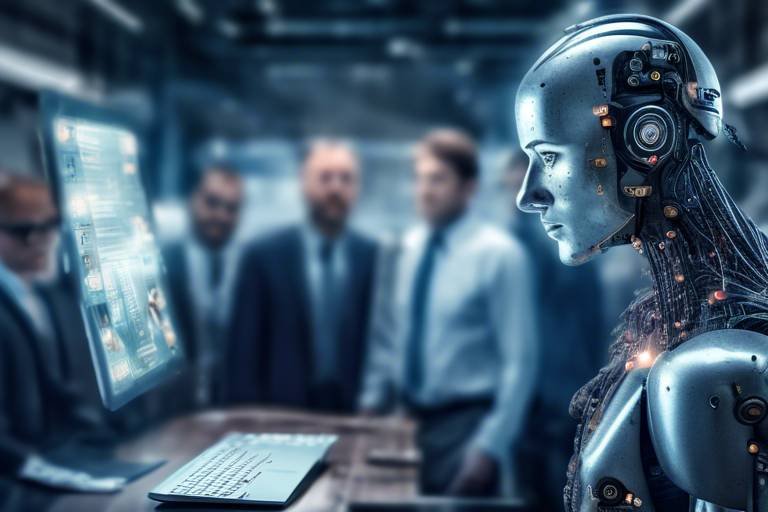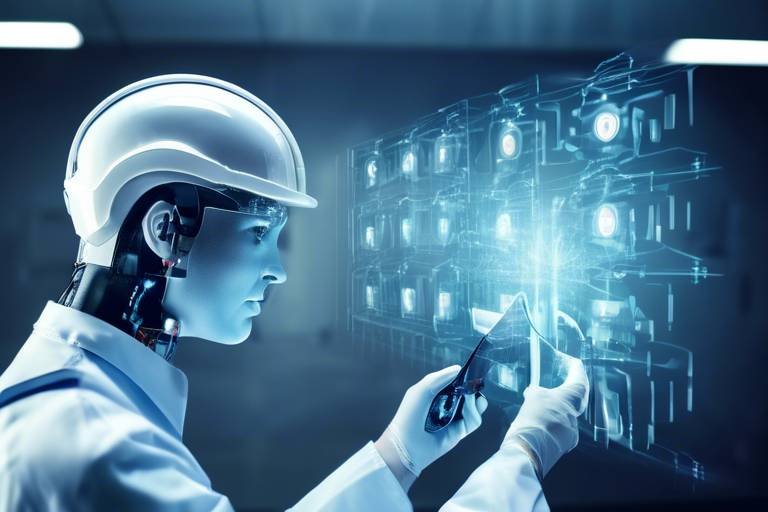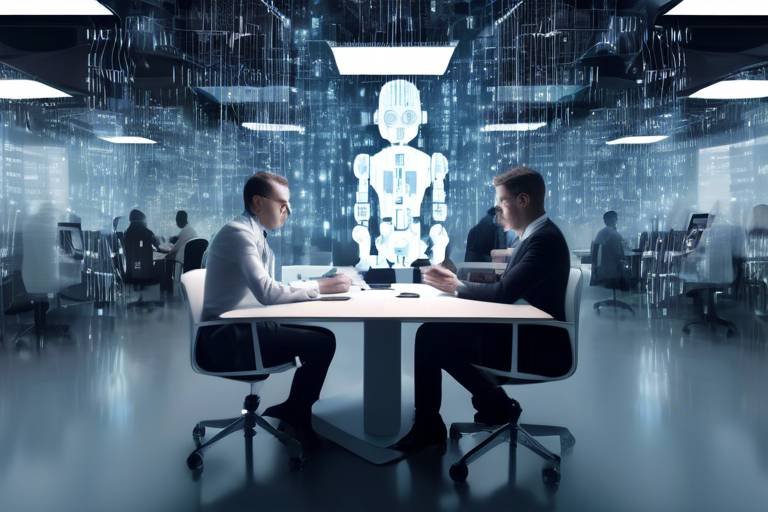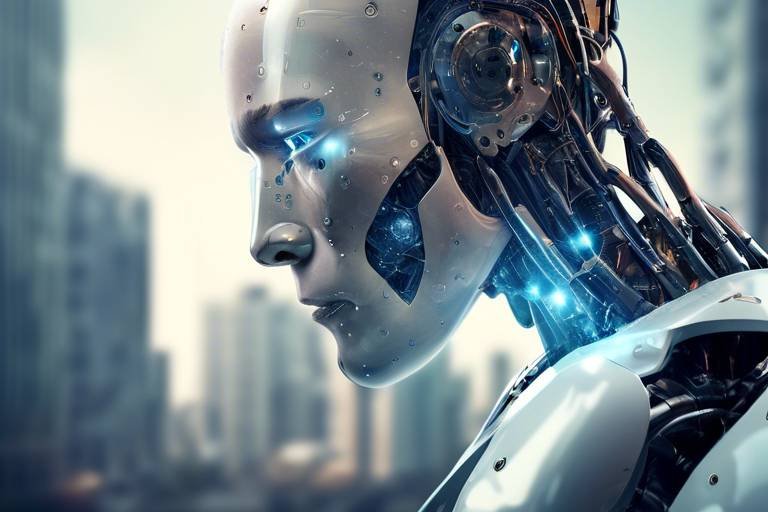AI and Future of Job Market: A Transformational Outlook
As we stand on the brink of a new era, the influence of artificial intelligence (AI) on the job market is undeniable. The integration of AI technologies into various sectors is not just a trend; it’s a transformational movement that is reshaping the way we work and live. Imagine walking into a workplace where machines handle mundane tasks, allowing humans to focus on creativity and strategic thinking. Sounds futuristic, right? Well, it’s happening now! This article delves into how AI is revolutionizing employment, the potential benefits and challenges it presents, and what we can expect in the coming years for both workers and employers.
AI technologies are increasingly being woven into the fabric of various industries, from healthcare to finance, and even retail. The current trends indicate that businesses are not just adopting AI for the sake of modernization; they are leveraging it to solve real-world problems and enhance operational efficiency. For instance, AI-driven analytics can predict consumer behavior, allowing companies to tailor their services more effectively. This is akin to having a crystal ball that provides insights into market trends and customer preferences. With the rapid advancements in machine learning and data processing, the workplace is evolving, and so are the job roles within it.
As AI continues to evolve, we must understand its impact on job availability. While some industries may face significant disruptions, others are seeing a surge in demand for skilled workers who can harness AI technologies. For example, sectors like healthcare and technology are experiencing a boom in job opportunities as they adapt to AI innovations. However, it’s essential to recognize that not all changes are negative. The advent of AI is redefining job roles, creating positions that didn’t exist a decade ago. Think of it as a double-edged sword: while some jobs may fade away, new ones are emerging, requiring a different set of skills.
AI is particularly effective in automating repetitive tasks, leading to increased efficiency and productivity. This is where the magic happens! By taking over mundane chores, AI allows employees to engage in more meaningful work. For instance, in customer service, AI chatbots can handle basic inquiries, freeing up human agents to tackle complex issues that require emotional intelligence and creativity. However, this shift raises questions about which jobs are most vulnerable to automation. It’s crucial to identify these roles to prepare the workforce for the future.
Certain roles are more susceptible to being replaced by AI. Jobs that involve repetitive tasks, such as data entry, assembly line work, and even some aspects of accounting, are at a higher risk of automation. According to a recent study, approximately 40% of jobs could be automated in the next two decades. This statistic might sound alarming, but it also serves as a clarion call for workers to adapt and evolve.
While some jobs may disappear, new roles will emerge. The rise of AI is giving birth to a variety of innovative job opportunities. For instance, positions like AI ethics compliance officer, data scientists, and machine learning engineers are becoming increasingly important. These roles require a unique blend of technical skills and critical thinking. It’s akin to the industrial revolution, where new technologies created jobs that had never been imagined before. Workers need to embrace this change and seek out opportunities to learn and grow in these new fields.
To thrive in an AI-driven job market, workers must adapt. Reskilling and upskilling initiatives will be crucial in preparing employees for future demands. Companies that invest in training their workforce not only benefit from enhanced productivity but also foster a culture of innovation. It’s a win-win situation! For workers, engaging in continuous learning is essential. Consider it like upgrading your smartphone; if you don’t keep up with the latest software, your device won’t function optimally. Similarly, staying updated with AI advancements ensures that employees remain relevant in their fields.
AI has the potential to significantly enhance productivity across various sectors. Companies are leveraging AI to streamline operations, reduce costs, and improve overall output. For instance, in manufacturing, AI-driven robots can work around the clock, increasing production rates while minimizing human error. This is not just about replacing human labor; it’s about augmenting it. When humans and machines collaborate, the results can be astonishing!
AI tools are increasingly being used to aid decision-making processes. Businesses utilize AI for data analysis, strategic planning, and forecasting. Imagine having a super-smart assistant that can sift through mountains of data and provide actionable insights in seconds. This capability allows companies to make informed decisions faster than ever before, giving them a competitive edge in the market. It’s like having a personal advisor who knows everything about your business and the market!
The future job market will likely see more collaboration between humans and AI. While there are challenges to this partnership, the benefits are immense. Working alongside AI can enhance human capabilities, allowing for greater creativity and innovation. However, it’s essential to address concerns regarding job displacement and the need for ethical guidelines in AI development. The key is to strike a balance where both humans and AI can thrive together.
- Will AI replace all jobs? - Not all jobs will be replaced; instead, many will be transformed or redefined.
- What skills will be in demand in an AI-driven job market? - Skills like data analysis, machine learning, and emotional intelligence will be crucial.
- How can workers prepare for the changes brought by AI? - Engaging in continuous learning and seeking reskilling opportunities is essential.

The Rise of AI in the Workplace
Artificial Intelligence (AI) is no longer just a buzzword; it’s a transformative force reshaping the very fabric of our workplaces. As we stand on the brink of a new era, AI technologies are being integrated into various industries, fundamentally altering traditional job roles and creating unprecedented opportunities. Imagine walking into an office where mundane tasks are handled by intelligent systems, allowing employees to focus on creative and strategic endeavors. This isn’t a scene from a sci-fi movie; it’s the reality of today's work environment.
Current trends show that AI is making significant inroads into sectors such as healthcare, finance, manufacturing, and even customer service. For instance, in healthcare, AI algorithms analyze patient data to assist doctors in diagnosing diseases more accurately and swiftly. In finance, AI-driven analytics help firms manage risks and make informed investment decisions. The manufacturing sector has also embraced AI, utilizing it for predictive maintenance and optimizing supply chains. These innovations not only enhance efficiency but also pave the way for a more agile workforce.
But what does this mean for the average worker? Well, it’s a double-edged sword. On one hand, the integration of AI can lead to increased productivity and job satisfaction, as employees can shift their focus from repetitive tasks to more engaging work. On the other hand, it raises concerns about job displacement and the need for new skill sets. The challenge lies in balancing these benefits and challenges, ensuring that workers are not left behind as technology advances.
As we delve deeper into the impact of AI, it’s essential to recognize the various innovations driving this change. From machine learning algorithms that predict consumer behavior to natural language processing tools that enhance customer interactions, AI is revolutionizing how businesses operate. Companies are increasingly adopting AI not just as a tool, but as a strategic partner in their operations.
In summary, the rise of AI in the workplace signifies a monumental shift in how we perceive work. While it brings forth exciting opportunities, it also challenges us to rethink our approach to employment, skills, and productivity. As we navigate this new landscape, it’s crucial to embrace the change and prepare for a future where humans and machines work hand in hand.
- What industries are most affected by AI? Industries like healthcare, finance, and manufacturing are seeing significant changes due to AI integration.
- Will AI replace all jobs? While AI may automate certain tasks, it is also likely to create new job roles that require human skills.
- How can workers prepare for an AI-driven job market? Workers should focus on reskilling and upskilling to adapt to the evolving demands of the job market.
- What are the benefits of AI in the workplace? AI enhances productivity, improves decision-making, and allows employees to focus on more engaging tasks.

Impact on Employment Opportunities
The advent of artificial intelligence (AI) in the workplace is not just a trend; it's a seismic shift that is reshaping the very fabric of employment opportunities. As AI technologies become more sophisticated, they bring about a dual-edged sword of potential benefits and challenges. On one hand, we see the emergence of new job roles that require a unique blend of technical skills and creativity. On the other hand, certain traditional roles are becoming obsolete, raising concerns about job security for many workers.
To truly understand the impact of AI on employment, we need to consider the **sectors** that are most affected. Industries such as manufacturing, retail, and even healthcare are experiencing a transformation. For instance, in manufacturing, AI-driven automation is streamlining production lines, which can lead to increased output but may also reduce the need for manual labor. Similarly, in healthcare, AI is revolutionizing diagnostics and patient care, creating demand for data analysts and AI specialists while possibly diminishing the need for routine administrative roles.
As we navigate this changing landscape, it's essential to recognize which job roles are being redefined and which are facing the brunt of automation. For example, jobs that involve repetitive tasks—like data entry or assembly line work—are particularly vulnerable. According to a recent study, it is estimated that up to 30% of jobs in these sectors could be automated within the next decade. However, this doesn't mean that all hope is lost. In fact, the very nature of work is evolving, and new opportunities are sprouting up like wildflowers after a rainstorm.
As certain roles fade away, we can expect to see a surge in emerging job categories. These new roles often require a combination of technical expertise and soft skills. For instance, jobs in AI ethics, data science, and machine learning engineering are becoming increasingly important. Companies are on the lookout for individuals who can bridge the gap between technology and human interaction, making skills like critical thinking, emotional intelligence, and adaptability more valuable than ever.
In this rapidly changing job market, the key to success lies in **reskilling** and **upskilling**. Workers must be proactive in adapting to these shifts. Organizations are recognizing the importance of investing in their employees’ growth. Many companies are now offering training programs that focus on digital literacy, AI tools, and other relevant skills. By empowering employees with the right knowledge and tools, businesses not only enhance productivity but also foster a culture of innovation.
In summary, the impact of AI on employment opportunities is both profound and multifaceted. While it presents challenges, it also opens up a world of possibilities for those willing to adapt and grow. As we look to the future, the question remains: will we embrace this change and shape our careers around it, or will we resist and risk being left behind?
- Will AI take away all jobs? - While AI will automate certain tasks, it will also create new job opportunities that require human skills.
- What skills should I develop to stay relevant in the job market? - Focus on skills in technology, data analysis, and soft skills like communication and critical thinking.
- How can companies support their employees during this transition? - Companies can offer training programs and resources for reskilling and upskilling.
- Are there specific industries that will grow due to AI? - Yes, industries like technology, healthcare, and renewable energy are expected to see significant growth.
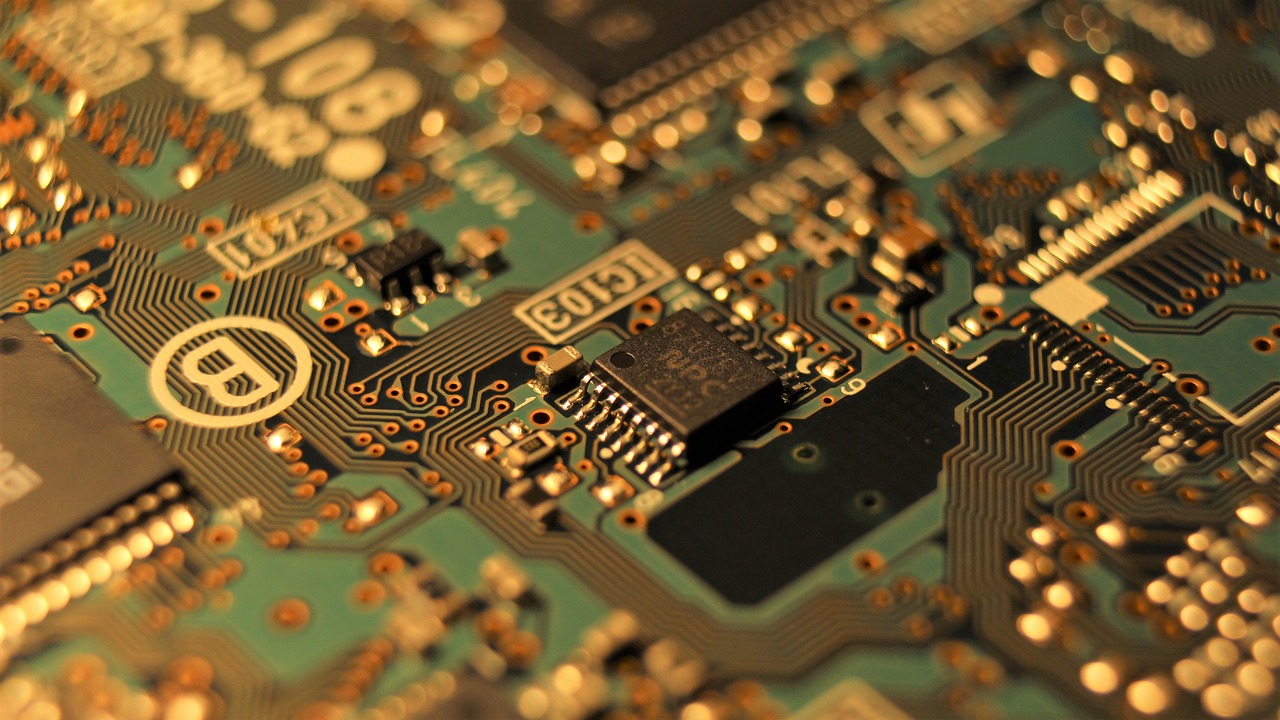
Automation of Routine Tasks
In today's fast-paced world, automation has become a buzzword, particularly in discussions surrounding artificial intelligence (AI). It's almost like having a magic wand that can wave away repetitive tasks, allowing humans to focus on more complex and creative challenges. Imagine a world where mundane activities like data entry, scheduling, and basic customer inquiries are handled by intelligent systems. Sounds appealing, right? This is not just a dream; it's the reality that many businesses are embracing as they integrate AI into their workflows.
AI excels at automating routine tasks, which can lead to remarkable efficiency gains. For instance, in sectors like manufacturing, AI-driven robots can perform assembly line tasks with precision and speed that far surpass human capabilities. In the service industry, chatbots can manage customer queries 24/7, providing instant responses and freeing up human employees to tackle more nuanced issues. The result? A workforce that is not just more productive but also more engaged in meaningful work.
However, the rise of automation does raise some important questions. Which jobs are at risk of being replaced? While it's true that many roles involving repetitive tasks are vulnerable, it's essential to note that the impact of automation varies across industries. Here are some sectors where routine task automation is making significant inroads:
- Manufacturing: Assembly line jobs are increasingly being taken over by robots.
- Retail: Self-checkout systems and inventory management software are reducing the need for cashiers.
- Customer Service: Chatbots are handling a growing number of customer interactions.
- Data Entry: Automated systems can input and manage data more accurately than humans.
As we navigate this transformative landscape, it's crucial for workers to understand that while some jobs may vanish, new opportunities are emerging. The key lies in adapting to these changes and embracing the technologies that can enhance our work lives.
In conclusion, automation of routine tasks is not merely about replacing human labor; it's about redefining roles and enhancing productivity. The future of work will likely see humans and AI working side by side, each complementing the other's strengths. As we look ahead, the challenge will be to find a balance that allows us to leverage the benefits of automation while ensuring that workers are equipped with the skills they need to thrive in this new environment.
- Will AI replace my job? While AI may automate certain tasks, it often creates new roles that require human oversight and creativity.
- What skills will be in demand in the future job market? Skills such as critical thinking, creativity, and emotional intelligence will be increasingly valuable.
- How can I prepare for changes in the job market? Focus on reskilling and upskilling through training programs and continuous learning opportunities.

Jobs at Risk
The advent of artificial intelligence (AI) has undoubtedly brought about a wave of transformation in the job market, but it also raises significant concerns regarding job security. As AI technologies become more sophisticated, certain roles are increasingly at risk of being automated. This phenomenon is not merely a passing trend; it's a fundamental shift that could redefine the employment landscape as we know it.
So, which jobs are most vulnerable to this technological upheaval? Generally, positions that involve repetitive tasks or routine decision-making are at the highest risk. For instance, jobs in manufacturing, data entry, and even some aspects of customer service are being automated at an alarming rate. In fact, a recent study estimates that up to 47% of jobs in the United States could be automated over the next two decades. This statistic is staggering and highlights the urgency for workers to adapt to the changing environment.
Let's take a closer look at some specific job categories that are facing significant challenges:
- Manufacturing Workers: Automation in factories has been on the rise, with robots now handling tasks that were once performed by humans. This shift not only increases efficiency but also reduces labor costs for companies.
- Administrative Assistants: Many administrative tasks, such as scheduling and data management, can now be handled by AI software, making traditional roles less necessary.
- Retail Cashiers: With the introduction of self-checkout systems and online shopping, the need for cashiers is diminishing rapidly.
- Transportation and Delivery Services: The rise of self-driving technology poses a significant threat to jobs in driving and delivery services.
However, it's important to note that while these roles are at risk, the automation of jobs doesn't mean a complete eradication of employment opportunities. Instead, it signifies a transformation. For every job that may be lost, new roles are being created that require different skill sets. The key lies in recognizing this shift and preparing for it.
Moreover, the impact of AI on jobs is not uniform across all sectors. Some industries may experience a more pronounced effect than others, particularly those heavily reliant on routine tasks. Conversely, sectors that require creativity, emotional intelligence, and complex problem-solving are likely to see a rise in demand for human workers. The challenge will be for employees to pivot towards roles that complement AI technologies rather than compete with them.
In conclusion, while the rise of AI presents a real threat to certain job categories, it also opens the door to new opportunities. Workers must stay informed and proactive in their career development to navigate this evolving landscape successfully. Embracing lifelong learning and adaptability will be crucial in ensuring job security in the age of AI.
Q: Which jobs are most at risk from AI?
A: Jobs that involve repetitive tasks, such as manufacturing, data entry, and retail cashier roles, are particularly vulnerable to automation.
Q: Will there be new job opportunities created by AI?
A: Yes, while some jobs may disappear, new roles requiring different skills will emerge, particularly in sectors that require human creativity and problem-solving.
Q: How can workers prepare for changes in the job market due to AI?
A: Workers can prepare by engaging in reskilling and upskilling initiatives, focusing on developing skills that complement AI technologies.

Emerging Job Roles
As we navigate through the transformative landscape shaped by artificial intelligence, it's essential to recognize that while some jobs may fade away, a plethora of new opportunities is emerging. This shift is not just a mere replacement; it's a redefinition of what work looks like in the modern age. Think of it as a garden where some plants wither, but others bloom vibrantly in their place. The key is to understand which roles are sprouting up and how they align with the demands of an AI-driven world.
One of the most exciting aspects of this evolution is the rise of roles that didn't even exist a decade ago. For instance, positions like AI Ethicist are becoming crucial as organizations strive to navigate the ethical implications of deploying AI technologies. These professionals ensure that AI systems are designed and implemented responsibly, addressing concerns related to bias, privacy, and accountability. Similarly, Data Curators are emerging as vital players, tasked with organizing and maintaining the vast amounts of data that AI systems rely on for training and operation. Their work ensures that AI algorithms can function effectively and ethically.
Moreover, the demand for AI Trainers is on the rise. These specialists are responsible for teaching AI systems how to perform specific tasks, often requiring a blend of technical knowledge and domain expertise. Imagine training a dog; you need to know how to communicate effectively to get the desired results. In the same way, AI Trainers help machines learn and adapt to various functions, making them indispensable in the tech landscape.
Another fascinating development is the emergence of Robotics Coordinators. As robotics becomes more integrated into industries such as manufacturing and healthcare, the need for individuals who can manage and coordinate robotic systems is growing. These professionals ensure that robots are functioning optimally and are integrated seamlessly into human workflows. It’s like being the conductor of an orchestra, ensuring that each instrument plays in harmony.
Additionally, the rise of the AI-Assisted Healthcare Professional is noteworthy. With AI tools aiding in diagnostics, treatment planning, and patient management, healthcare workers will need to adapt to these technologies. This role requires a blend of medical knowledge and tech-savviness, enabling professionals to leverage AI for improved patient outcomes.
To sum it up, the job market is not disappearing; it's evolving. The roles emerging from AI advancements are diverse and dynamic, requiring a range of skills from technical expertise to ethical considerations. As we embrace these changes, it's crucial for current and future workers to stay informed and adaptable, ready to seize the opportunities that this new landscape presents.
- What are some examples of emerging job roles due to AI?
Examples include AI Ethicist, Data Curator, AI Trainer, Robotics Coordinator, and AI-Assisted Healthcare Professional. - Will AI replace all jobs?
No, while some jobs may be automated, many new roles will emerge that require human skills and oversight. - How can workers prepare for these emerging roles?
Workers can prepare by upskilling and reskilling, focusing on areas such as data analysis, AI ethics, and technology integration.

Reskilling and Upskilling Workforce
As we navigate the ever-evolving landscape of the job market, one thing becomes abundantly clear: reskilling and upskilling are no longer optional; they are essential. With the rapid integration of artificial intelligence into various industries, workers must adapt to stay relevant. Imagine a world where the skills you learned in school are outdated before you even start your first job. It’s not just a possibility; it’s a reality for many today. Companies are increasingly looking for employees who can adapt to new technologies and processes, making continuous learning a vital component of career success.
Consider this: in the past, a degree might have been enough to secure a job for life. Now, with AI automating tasks and changing job roles, the need for ongoing education is paramount. Workers must embrace a mindset of lifelong learning, continuously updating their skill sets to keep pace with technological advancements. This shift is not only about survival; it’s about thriving in a competitive job market.
To better understand the importance of reskilling and upskilling, let’s break down some key areas where these initiatives are crucial:
- Technology Proficiency: As AI tools become more prevalent, workers need to be comfortable using them. This includes everything from basic software skills to advanced data analysis.
- Soft Skills: Skills such as communication, problem-solving, and teamwork are becoming increasingly valuable. AI may handle data, but human intuition and creativity are irreplaceable.
- Industry-Specific Knowledge: Different sectors will require unique skills. For instance, healthcare professionals may need to learn about AI applications in patient care, while marketers should focus on AI-driven analytics.
Moreover, companies are recognizing the value of investing in their workforce. Organizations that prioritize reskilling and upskilling not only enhance employee satisfaction but also improve overall productivity and innovation. This creates a win-win scenario: workers gain new skills, and companies benefit from a more competent and agile workforce.
In response to these changes, many organizations are implementing training programs aimed at equipping their employees with the necessary skills to adapt to new technologies. These programs often include:
| Training Type | Description | Examples |
|---|---|---|
| Online Courses | Flexible learning options that employees can complete at their own pace. | Coursera, Udemy, LinkedIn Learning |
| Workshops | In-person or virtual sessions focused on specific skills or technologies. | Tech boot camps, company-led workshops |
| Mentorship Programs | Pairing less experienced employees with seasoned professionals for guidance. | Internal mentorship initiatives |
As we look to the future, the emphasis on reskilling and upskilling will only grow stronger. Workers who take the initiative to enhance their skills will not only secure their positions but also open doors to new opportunities. It’s a bit like a game of chess; if you want to stay in the game, you need to anticipate your opponent’s moves and adapt your strategy accordingly.
In conclusion, embracing a culture of continuous learning is vital for both employees and employers. By investing in reskilling and upskilling initiatives, we can create a workforce that is not only prepared for the challenges of an AI-driven world but also capable of leveraging these technologies to drive innovation and growth.
Q1: What is the difference between reskilling and upskilling?
A1: Reskilling refers to learning new skills for a different job role, while upskilling involves enhancing existing skills to improve performance in the current role.
Q2: Why is reskilling important in the age of AI?
A2: As AI technologies evolve, many traditional job roles are changing or being automated. Reskilling helps workers adapt to these changes and remain competitive in the job market.
Q3: How can companies support reskilling initiatives?
A3: Companies can implement training programs, provide access to online courses, and create mentorship opportunities to support employee development.

AI's Role in Enhancing Productivity
In today's fast-paced world, the integration of artificial intelligence (AI) into various sectors is not just a trend; it's a revolution. Companies are rapidly discovering that AI can be a game-changer when it comes to enhancing productivity. Imagine having an assistant that never sleeps, works tirelessly, and can analyze data faster than any human ever could. That’s the power of AI! It allows organizations to streamline their operations, reduce costs, and ultimately, drive growth. But how exactly is AI reshaping productivity?
One of the key ways AI is enhancing productivity is through automation. By automating repetitive tasks, businesses can free up their employees to focus on more complex and creative work. For instance, in industries like manufacturing, AI-driven robots are taking over mundane tasks, allowing human workers to engage in higher-level problem-solving and innovation. This shift not only boosts efficiency but also leads to greater job satisfaction as employees find themselves doing work that is more fulfilling.
Moreover, AI plays a pivotal role in data analysis. Companies are inundated with vast amounts of data, and sifting through this information manually can be a Herculean task. AI algorithms can process and analyze data at lightning speed, providing insights that can inform strategic decisions. For example, a retail company can use AI to predict customer preferences based on purchasing patterns, enabling them to tailor their marketing strategies effectively. This not only enhances productivity but also improves customer satisfaction.
Another fascinating aspect of AI's role in productivity is its ability to assist in decision-making processes. AI tools can analyze trends and forecast outcomes, allowing businesses to make informed decisions quickly. This capability is especially valuable in industries like finance and healthcare, where timely decisions can lead to significant advantages. By leveraging AI for predictive analytics, organizations can stay ahead of the curve and respond proactively to market changes.
Collaboration between humans and AI is also becoming increasingly common. Rather than viewing AI as a replacement for human workers, many companies are embracing a hybrid approach where both can coexist and complement each other. For example, in creative fields, AI can generate ideas or assist in design, while humans can refine and add the emotional touch that machines lack. This partnership not only enhances productivity but also fosters a culture of innovation.
However, the journey towards an AI-enhanced workforce is not without its challenges. Companies must invest in training and development to ensure that their employees are equipped with the skills necessary to work alongside AI technologies. This is where the importance of reskilling and upskilling comes into play. Organizations that prioritize continuous learning will be better positioned to harness the full potential of AI, driving productivity to new heights.
In summary, AI is not merely a tool; it is a transformative force that is reshaping how businesses operate. By enhancing productivity through automation, data analysis, informed decision-making, and collaboration, AI is paving the way for a more efficient and innovative future. The key takeaway? Embracing AI is not just about keeping up with the competition; it's about redefining the very nature of work itself.
- How does AI improve productivity in the workplace?
AI improves productivity by automating repetitive tasks, enhancing data analysis, and assisting in decision-making processes, allowing employees to focus on more strategic and creative tasks. - What industries are most affected by AI implementation?
Industries such as manufacturing, retail, finance, and healthcare are significantly impacted by AI, as they benefit from automation and advanced data analytics. - Can AI replace human jobs?
While AI may replace certain repetitive jobs, it also creates new opportunities and roles that require human creativity, emotional intelligence, and strategic thinking. - What skills will be in demand in an AI-driven job market?
Skills such as data analysis, AI management, creative problem-solving, and emotional intelligence will be crucial as the job market evolves with AI technologies.

AI in Decision-Making Processes
In today's fast-paced business environment, decision-making is more critical than ever. Companies are inundated with data, and the challenge lies in making sense of it all. Enter Artificial Intelligence (AI), a powerful ally in the decision-making process. AI technologies, such as machine learning and predictive analytics, are revolutionizing how businesses analyze data and make choices. Imagine having a super-smart assistant that can sift through mountains of information in seconds, identifying patterns and providing insights that would take humans hours, if not days, to uncover. Sounds amazing, right?
AI doesn't just crunch numbers; it enhances the quality of decisions by providing real-time insights. For instance, consider a retail company utilizing AI to analyze customer purchasing behavior. By examining past transactions and current trends, AI can forecast future buying patterns, allowing businesses to optimize inventory and tailor marketing strategies. This not only saves time but also increases the likelihood of making informed decisions that resonate with customers. In a way, AI acts like a crystal ball, offering a glimpse into future possibilities based on historical data.
One of the most significant advantages of integrating AI into decision-making processes is its ability to reduce human bias. We all have our biases, whether we realize it or not, and these can cloud our judgment. AI, on the other hand, processes data without preconceived notions, leading to more objective conclusions. For example, in hiring processes, AI can analyze resumes and applications based purely on qualifications and experience, rather than factors like gender or ethnicity, which may unconsciously influence human recruiters. This shift not only promotes fairness but also helps companies build a more diverse workforce.
However, it’s essential to remember that AI should not entirely replace human intuition and creativity. While AI excels at analyzing data, it lacks the emotional intelligence and contextual understanding that humans bring to the table. Therefore, the most effective decision-making strategies will likely involve a collaboration between AI and human decision-makers. This synergy can lead to more comprehensive and well-rounded decisions, combining the analytical prowess of AI with the nuanced understanding of human experiences.
To illustrate the impact of AI on decision-making, consider the following table that highlights key areas where AI is making a difference:
| Area of Decision-Making | AI Contribution | Benefits |
|---|---|---|
| Marketing Strategies | Customer behavior analysis | Targeted campaigns, higher ROI |
| Financial Forecasting | Predictive analytics | Improved budgeting, risk management |
| Supply Chain Management | Inventory optimization | Reduced costs, better resource allocation |
| Human Resources | Resume screening | Enhanced diversity, efficient hiring |
As we move forward, the role of AI in decision-making will only grow. Companies that embrace these technologies will likely find themselves at a competitive advantage, able to pivot quickly and make informed choices based on real-time data. So, the next time you think about decision-making, remember that AI is not just a tool but a transformative force that can elevate the way we think, analyze, and act.
- How does AI improve decision-making? AI enhances decision-making by analyzing large volumes of data quickly, identifying trends, and providing insights that help businesses make informed choices.
- Can AI completely replace human decision-makers? No, while AI can provide valuable data and insights, human intuition and emotional intelligence are irreplaceable in many decision-making scenarios.
- What industries benefit most from AI in decision-making? Industries such as retail, finance, healthcare, and human resources see significant benefits from AI-driven decision-making processes.

Collaboration Between Humans and AI
The future of work is not just about machines taking over; it's about a harmonious collaboration between humans and artificial intelligence. Imagine walking into an office where your AI assistant not only manages your calendar but also helps you brainstorm ideas for your next project. This is not science fiction; it's the reality of today's workplace. As AI systems become more sophisticated, they are increasingly capable of handling complex tasks that once required human intuition and creativity. However, instead of replacing us, AI is becoming a powerful tool that augments our abilities.
So, how exactly does this collaboration work? Picture a chef in a busy restaurant. With the help of AI, the chef can analyze customer preferences and optimize menus based on real-time data. This means that the chef can focus on what they do best: creating delicious meals while the AI crunches the numbers. This synergy allows businesses to operate more efficiently and effectively, leading to enhanced customer satisfaction and improved profit margins.
Moreover, the collaboration between humans and AI is not limited to just specific industries. It spans across various fields, including healthcare, finance, and education. For instance, in healthcare, AI algorithms can assist doctors in diagnosing diseases by analyzing medical records and suggesting treatment options. This doesn’t diminish the role of the healthcare professional; instead, it empowers them to make more informed decisions, ultimately leading to better patient outcomes.
However, this shift towards collaboration also brings its own set of challenges. Workers may feel threatened by the presence of AI, fearing that their roles could be diminished or made obsolete. The key here is to foster an environment of trust and understanding. Organizations must prioritize training and development to ensure that employees feel equipped to work alongside AI technologies. This could involve reskilling programs that teach workers how to leverage AI tools effectively, transforming them from potential competitors into valuable collaborators.
To illustrate the benefits of human-AI collaboration, consider the following table which outlines various sectors and the ways AI is enhancing human roles:
| Sector | Human Role | AI Contribution |
|---|---|---|
| Healthcare | Doctors | AI assists in diagnostics and treatment recommendations. |
| Finance | Financial Analysts | AI analyzes market trends and provides insights for investment strategies. |
| Education | Teachers | AI personalizes learning experiences for students. |
| Manufacturing | Assembly Line Workers | AI optimizes production processes and predicts maintenance needs. |
In conclusion, collaboration between humans and AI is set to redefine the workplace landscape. While there may be hurdles to overcome, the potential benefits are immense. By embracing this partnership, we can unlock new levels of creativity, efficiency, and productivity. The future isn't about man versus machine; it's about man with machine, working together to tackle challenges and seize opportunities.
- Will AI replace all jobs? - Not entirely. While AI will automate certain tasks, it will also create new job opportunities that require human skills.
- How can I prepare for an AI-driven job market? - Focus on reskilling and upskilling in areas that complement AI technologies, such as data analysis and critical thinking.
- What are the benefits of collaborating with AI? - Collaboration can lead to improved efficiency, better decision-making, and enhanced creativity in problem-solving.
Frequently Asked Questions
- How is AI changing the job market?
AI is revolutionizing the job market by automating routine tasks, creating new job roles, and enhancing productivity. As industries adopt AI technologies, traditional roles are evolving, and new opportunities are arising for those willing to adapt.
- Which jobs are most at risk due to AI automation?
Jobs that involve repetitive tasks, such as data entry, assembly line work, and certain customer service roles, are particularly vulnerable to automation. However, it's essential to recognize that while some positions may disappear, new ones will emerge that require different skills.
- What new job roles are being created by AI?
AI is giving rise to various new job roles, including AI specialists, data analysts, and machine learning engineers. These positions often require skills in programming, data analysis, and a deep understanding of AI technologies. Embracing lifelong learning is key to staying relevant.
- How can workers prepare for an AI-driven job market?
Workers can prepare by engaging in reskilling and upskilling initiatives. This includes taking courses in technology, data science, and other relevant fields to enhance their skill set and remain competitive in a rapidly changing workforce.
- What role does AI play in enhancing productivity?
AI enhances productivity by streamlining processes, improving efficiency, and enabling better decision-making through data analysis. Companies leverage AI tools to gain insights that help them make informed strategic choices, ultimately leading to increased output and profitability.
- Will humans still be needed in the workplace with AI's rise?
Absolutely! While AI will take over certain tasks, humans will still play a crucial role in areas like creativity, emotional intelligence, and complex problem-solving. The future will likely involve collaboration between humans and AI, where each complements the other's strengths.


